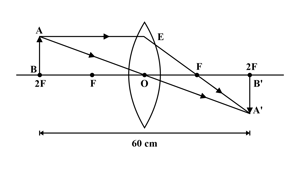Narendra Kumar Solutions for Chapter: Light - Reflection and Refraction, Exercise 6: HIGHER ORDER THINKING SKILLS (HOTS)
Narendra Kumar Physics Solutions for Exercise - Narendra Kumar Solutions for Chapter: Light - Reflection and Refraction, Exercise 6: HIGHER ORDER THINKING SKILLS (HOTS)
Attempt the free practice questions on Chapter 4: Light - Reflection and Refraction, Exercise 6: HIGHER ORDER THINKING SKILLS (HOTS) with hints and solutions to strengthen your understanding. Science Part-I NEW ERA PHYSICS Textbook for Class X solutions are prepared by Experienced Embibe Experts.
Questions from Narendra Kumar Solutions for Chapter: Light - Reflection and Refraction, Exercise 6: HIGHER ORDER THINKING SKILLS (HOTS) with Hints & Solutions
An object high produces a real image high, when placed at a distance of from concave mirror. Calculate the position of the image.
The following table gives the values of refractive indices of a few media:
| S.No. | |||||
| Medium | Water | Crown glass | Rock salt | Ruby | Diamond |
| Refractive index |
Use this table to give an example of (i) a medium pair so that light speeds up when it goes from one of these media to another (ii) a medium pair so that light slows down when it goes from one of these media to another.
Refractive index of water is and that of the glass is with regard to air. What is the refractive index of glass with respect to the water?
How much time will light take to cross thick glass pane if refractive index of glass is ?
Explain with the help of a diagram, why a pencil partly immersed in water appears to be bent at the water surface?
A diverging lens of focal length forms an image of from the lens. Draw a scale diagram for the formation of image.
A concave lens of focal length and a convex lens of focal length are placed in contact with each other. What is the power of this combination? Also, calculate focal length of this combination.
The image of an object formed by a lens is of magnification . If the distance between the object and its image is , what is the focal length of the lens? If the object is moved towards the lens, where would the image be formed? State reason and also draw a ray diagram in support of your answer.

